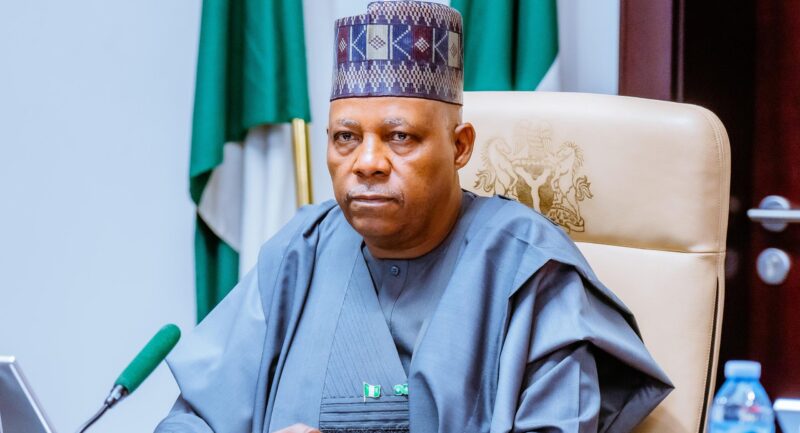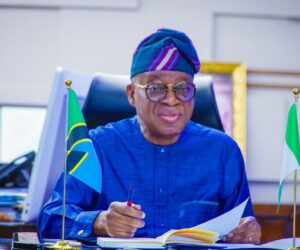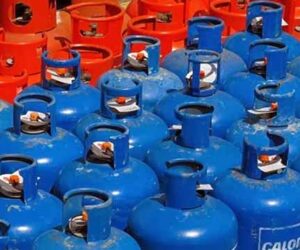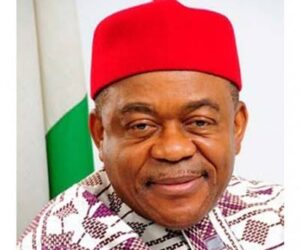1
ABUJA – Nigeria’s Vice President Kashim Shettima on Tuesday estimated Nigeria’s vast investment potential in the energy transition at $410 billion by 2060.
Speaking at the opening ceremony of the Nigerian Renewable Energy Innovation Forum (NREIF) 2025, the Vice President underscored that over $23 billion of this capital is critically needed to provide electricity access to millions still living in energy poverty.
He emphasized that Nigeria’s ambitious energy roadmap targets a total installed power capacity of 277 gigawatts by 2060, stressing that the expansion will rely heavily on renewable energy sources, alongside investments in energy storage systems, grid expansion, and clean technology infrastructure.
Shettima’s remarks come amid increasing national and global focus on sustainable energy development, positioning Nigeria to leverage this transformative period for both economic growth and social progress.
The forum’s theme, “Implementing the Nigeria First Policy: Facilitating Local Content Development and Manufacturing in the Renewable Energy Ecosystem,” reinforces the government’s industrial strategy focused on anchoring Africa’s renewable energy supply chains in Nigeria.
Also speaking during the event, Chief Adebayo Adelabu, Minister of Power, noted that the forum’s theme, “Implementing the Nigeria First Policy,” transcends mere manufacturing to embrace national pride, industrial competence, and economic sustainability.
He emphasized that all future solar panels, battery storage systems, and associated technologies deployed nationally would proudly bear the “Made in Nigeria” label, aligned with President Bola Ahmed Tinubu’s Renewed Hope Agenda prioritizing homegrown innovation and industrial self-reliance.
Highlighting major strides, the Minister announced that strategic partnerships formalized at NREIF 2025 will enable Nigeria to achieve nearly 4 gigawatts of solar manufacturing capacity annually, nearly 80 percent of current national generation capacity.
The Rural Electrification Agency (REA) remains a key partner, continuously expanding access to unserved areas via mini-grids and distributed renewable energy, while fostering private sector growth to transform Nigeria’s energy ecosystem from access to full industrialization.
Adelabu detailed the Federal Government’s comprehensive approach to revitalize the power sector, spanning legislation, policy reforms, infrastructure development, energy transition, and local capacity building.
According to him, “A landmark was the 2023 Electricity Act, which devolved regulatory powers to states, resulting in 15 states gaining autonomy to create subnational electricity markets aimed at boosting competition and private investment.
“Policy reforms include the Integrated National Electricity Policy, the first sector-wide framework in two decades, driving sustainable growth. Commercial reforms have increased industry revenue by 70%, reaching ₦1.7 trillion in 2024, with projections of over ₦2 trillion in 2025. To stabilize finances, the President approved a ₦4 trillion bond to clear verified debts to generation and gas suppliers, complemented by targeted subsidies for vulnerable households.
“Infrastructure programs like the Presidential Power Initiative (PPI) have expanded transmission capacity by over 700MW in Phase Zero, with Phase One contracts signed to add an additional 7,000MW. Generation enhancements include rehabilitating NIPP plants and the integration of the 700MW Zungeru Hydropower Plant, boosting average capacity to 5,300MW in 2024 from 4,200MW in 2023. The Transmission Company of Nigeria was unbundled into two entities for market operation and infrastructure management, a critical sector reform.
“The Presidential Metering Initiative is set to deploy 1.1 million meters by year-end, with millions more planned, closing the national metering gap and improving revenue assurance.
“Additionally, the government has mobilized over $2 billion in funding for energy access expansion via off-grid and mini-grid projects, supported by international partners including the World Bank and JICA”.
Adelabu also celebrated recent investments in workforce training, unveiling upgraded facilities at the National Power Training Institute of Nigeria (NAPTIN) to boost technical skills in the sector.Closing his remarks, the Minister reaffirmed Nigeria’s readiness for business, urging stakeholders to collaborate boldly and invest confidently to fuel industrial growth and secure a prosperous energy future for the country.
The forum draws critical investment commitments exceeding $400 million into Nigeria’s renewable energy manufacturing value chain, poised to create over 1,500 jobs and accelerate local industrialization efforts.








